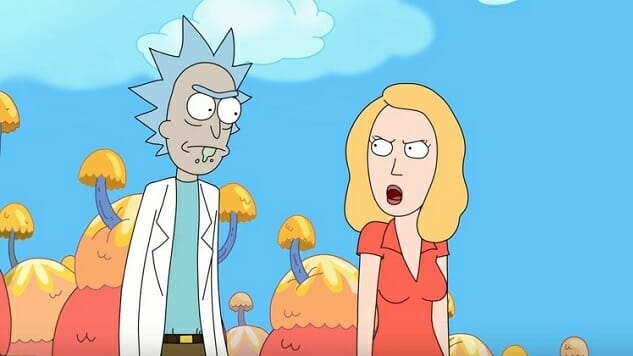Who’s The Monster On Rick and Morty?
Episode 3.09: "The ABCs of Beth"

One of my favorite things about Rick and Morty’s third season is that the show, despite having a small cast of regulars, is still finding new dynamics to build up. Sometimes that’s come in the form of altering the titular relationship, but it’s also informative to see other members of the Smith family interact with the greatest and most self-destructive intellect in the universe. For example, Jerry’s persona hardly changed when he spent time with Rick in “The Whirly Dirly Conspiracy,” because Jerry has always been a milquetoast, piteous fool with a powerful self-preservation instinct. Although given what we learn about Beth in “The ABCs of Beth,” perhaps that’s not entirely Jerry’s fault.
Beth has quietly developed into more than just a trope for abandonment issues. She was the focus of the gut punch ending of “Pickle Rick,” which took her beyond merely yearning for her father’s company and into the realm of the dangerously irresponsible—for the first time, she seemed ominously like Rick’s daughter. “The ABCs of Beth” is all about expanding upon that idea, and in the process, it addresses the core philosophy of Rick and Morty—how to make meaning from the inherent meaninglessness of the universe—more directly than any episode so far this season. That’s literally what Rick did for Beth by creating Froopyland when she was a kid, and now, in her mid ‘30s, Beth has the type of nihilist epiphany that’s most common to college freshman who love smoking weed and believing they understand Thus Spoke Zarathustra. Luckily for her—or perhaps unluckily—she almost immediately recognizes that her dad shares this worldview and is able to move on to deciding what to do about it.
In theory, this development should’ve been Rick and Morty’s best moment to date. The happiest we’ve ever seen Beth isn’t even this current Beth: it’s the Beth on Cronenberg-Earth, a place that doesn’t even pretend to be coherent and allows her to carve meaning out of the dead bodies of Cronenbergs. Cronenberg-Earth is the antithesis of Froopyland, which is why destroying the imaginary world’s creatures and killing Tommy (Thomas Middleditch!) provides the catharsis this version of Beth so desperately needed. Her sudden realization that she’s becoming her father—and her immediate acceptance of this fact and subsequent slaughter of Tommy’s victims/food—is perhaps her best moment on the show, in that it happens at blazing Rick and Morty speed and runs with its new reality immediately, only providing an emotional wallop in the aftermath.
-

-

-

-

-

-

-

-

-

-

-

-

-

-

-

-

-

-

-

-

-

-

-

-

-

-

-

-

-

-

-

-

-

-

-

-

-

-

-

-








































